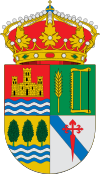Palas de Rei
| Palas de Rei | ||
|---|---|---|
| Municipality | ||

Church of Santiago de Albá.
|
||
|
||
| Location in Spain | ||
| Coordinates: 42°52′25″N 7°52′10″W / 42.87361°N 7.86944°W | ||
| Country | Spain | |
| Autonomous community | Galicia | |
| Province | Lugo | |
| Comarca | A Ulloa | |
| Government | ||
| • Mayor | Pablo José Taboada Camoira | |
| Area | ||
| • Total | 199.68 km2 (77.10 sq mi) | |
| Elevation | 534 m (1,752 ft) | |
| Population (2009) | ||
| • Total | 3,678 | |
| • Density | 18/km2 (48/sq mi) | |
| Demonym(s) | Palenses | |
| Time zone | CET (UTC+1) | |
| • Summer (DST) | CEST (UTC+2) | |
| Postal code | 27200 | |
| Dialing code | 982 | |
| Website | Official website | |
Palas de Rei is a town in the province of Lugo, Galicia in northwestern Spain. It belongs to the comarca of A Ulloa.
According to the INE, the population was 3,268 inhabitants.
The history of Palas de Rei appears closely linked to military culture, which retains many of the archaeological remains (dolmens and forts) from a remote settlement. According to tradition, the city owes its name "Pallatium regis" to the palace of the Visigothic king Witiza, who reigned between 702 and 710. In Palas, Witiza would have killed the Duke of Galicia, Favila, father of Don Pelayo.
...
Wikipedia


